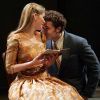Question about the term "legitimate" as it applies to music.
#1Question about the term "legitimate" as it applies to music.
Posted: 7/4/09 at 3:25pm
I'm just now starting to take "real" and steady vocal lessons, and I have a question about the word legitimate (or legit) as it applies to music...especially in the broadway style and sense.
I hear Kristin Chenoweth uses it ALL the time to describe her voice.
Sometimes auditors will say something about doing a "legit" song...in the past I just sing a ballad...knowing at least that much.
But what exactly is a legitmate song and what does the term mean as it applies to music.
Is it as simple as to say an "illegitimate" song might be a character-type song with maybe some acting...or showstoping stuff in it.
And a legitimate song is more or less about the quality of the voice?
#2re: Question about the term 'legitimate' as it applies to music.
Posted: 7/4/09 at 3:31pm
this might be incorrect, but when I think of "legitimate" songs and music, I tend to think of older musicals, like those by Rodgers and Hammerstein or Lerner and Loewe. Or more recent musicals by someone like Guettel. I think of them as being more similar to classical music than to pop music.
#2re: Question about the term 'legitimate' as it applies to music.
Posted: 7/4/09 at 3:33pm
In most cases, people will use the term "legit" when describing songs that require a more classically trained voice or technique than say a song like Defying Gravity. It also usually does not refer to belting and/or screaming your face off type of music.
When you think legit, think more of the good ol' standards from the 40s-60s. Much of Rodgers and Hammerstein, Porter, Loesser, and more recently, composers such as Maury Yeston, Lucy Simon, and Adam Guettel.
#3re: Question about the term 'legitimate' as it applies to music.
Posted: 7/4/09 at 3:34pm
I think musikman said it much better than I did.
I would also add Sondheim in as more of a legit composer.
snowskittle
Leading Actor Joined: 1/10/09
#4re: Question about the term 'legitimate' as it applies to music.
Posted: 7/5/09 at 11:47amSo is legit something a composer is or does? Or something a singer does or interprets?
#5re: Question about the term 'legitimate' as it applies to music.
Posted: 7/5/09 at 1:16pmI think it applies to both...but mainly the way the music was intended to be sung (if I understand it correctly).
SporkGoddess
Broadway Legend Joined: 7/27/05
#6re: Question about the term 'legitimate' as it applies to music.
Posted: 7/5/09 at 1:52pm
From what I understand, legitimate refers to singing songs in the corresponding registers (as in, not belting).
Of course, I could be wrong.
#7re: Question about the term 'legitimate' as it applies to music.
Posted: 7/5/09 at 2:24pmSo...say...Sutton Foster is not singing legitimate when she sings something like "Gimme Gimme" or "Astonishing"?
#9re: Question about the term 'legitimate' as it applies to music.
Posted: 7/5/09 at 3:11pm
Really?
Well since "showtunes" are what I know the best,
could someone give me an example of each so that I could compare them?
And...if it's not just the belting or rock/pop style of singing that makes a some that makes a song not legit, could you give me an example of a soprano/tenor/baritone song that is not legit in terms of the structure of the song, rather than the voice?
SporkGoddess
Broadway Legend Joined: 7/27/05
#10re: Question about the term 'legitimate' as it applies to music.
Posted: 7/5/09 at 3:40pm
I guess legit style for a song would be.. more classical versus pop or rock style. It's hard to explain. :/
For instance, "Johanna" (Anthony's version) from Sweeney Todd is a legit song for a tenor. "It Takes Two" from Hairspray is not.
#11re: Question about the term 'legitimate' as it applies to music.
Posted: 7/5/09 at 3:54pmThat makes sense.
#12re: Question about the term 'legitimate' as it applies to music.
Posted: 7/5/09 at 7:06pm
I think the term "legit" as applied to singers refers more to a singer's ability to sing a song with little or no microphone enhancement, as was done in musical theater for decades prior to the 1950's (I believe that the original 1949 production of South Pacific was the first Broadway show to use microphones but it was only a couple of stage mikes to help carry the sound in the somewhat larger than normal theater where the show was performed.) Body mikes did not come into use with regularity until the 1970's although Carol Channing used one as early as 1963 in Hello Dolly.
Before the 1970's musical theater singers were trained to project their voices naturally, pretty much the same as opera singers, but without sounding like an opera singer. A few of today's theater singers have also trained this way (James Barbour, Brian Stokes Mitchell, Christine Ebersole, for example). In the musicals through the early 1970's, the leading roles were more often than not written for such singers, including songs by the Gershwins, Rodgers & Hammerstein, Frank Loesser, Lerner & Loewe, Jule Styne, Sondheim and especially the complex melodies of Jerome Kern. But at the same time the songs of these composers were introduced to a much wider audience in the 1930's & 40's and to a lesser extent in the 1950's & 60's, via recordings and radio by pop singers such as Judy Garland, Frank Sinatra, Al Jolson, Alice Faye, Nelson Eddy, Jane Froman, Tony Martin etc., all of whom sang through a microphone in live performance but usually in smaller venues. However, most of these singers were much more instinctive interpreters of the pop music of this period (which included the majority of musical theater songs) than any of today's singers, mainly because they lived during a time when this music was fresh and new to the public. Most of these singers also appeared in film musicals as well but among them only Eddy, Froman, perhaps Garland & Martin had voices strong enough to project in a large auditorium without the use of a mike. Even 1950's singers of the pop & pre-rock era had strong voices that did not require excessive miking or in smaller venues none at all to be heard, for instance, Vic Damone, Elvis Presley, Pat Boone, Barbra Streisand and especially Gordon MacRae.
Carousel was one of the last totally acoustic Broadway musicals and the Soliloquy is one of the toughest solos any singer could encounter, not only because of its 7 minute length but also because of its near operatic demands on the singer. John Raitt, the original Billy Bigelow, could sing this beautifully, piercing effortlessly through the brass heavy pit orchestra while maintaining the subtle dramatic moments of the piece, with no microphone enhancement whatsoever. By contrast, Michael Hayden, in the 1994 revival, even with a body mike, could barely manage the Soliloquy without straining on passages that even an average opera singer of today could navigate with ease, even though he is probably the finest actor to ever play Billy Bigelow on the stage.
The premise that body mikes allow a singer to perform with more subtlety is completely false. Larry Kert & Carol Lawrence, the original Tony & Maria in West Side Story, with minimal miking, conveyed drama, intimacy and beauty in their performances that Matt Cavenaugh & Josephina Scaglione in the current revival, cannot even imagine, much less duplicate.
Although several fine contemporary composers are writing music that could benefit greatly from a more legit sound, this is unfortunately not going to happen in a musical theater climate such as today where the sound designer is considered more important than the singer.
#13re: Question about the term 'legitimate' as it applies to music.
Posted: 7/5/09 at 8:45pm
MEN:
Legit: "Wish I Were In Love Again" (Babes in Arms)
Not Legit: "Lost in the Wilderness" (Children of Eden)
snowskittle
Leading Actor Joined: 1/10/09
#14re: Question about the term 'legitimate' as it applies to music.
Posted: 7/5/09 at 9:29pm
Thanks Dayao for the very interesting history lesson.
You mentioned the sound designer possibly being more important than the singer. Hmmm...raises another question in my mind. When they do sound checks before a show, are they adjusting the mikes for the volune/voice of each individual singer? Or at least the principals? And do they reset them individually if an understudy goes on instead?
#15re: Question about the term 'legitimate' as it applies to music.
Posted: 7/5/09 at 11:26pm
From the 1950's up to about the mid 1970's the primary goal of the sound engineer in musical theater was to reinforce the live sound but to never intrude with the aural impression that it was all coming from the stage. The sound design was far less noticeable. With the advent of more pop and rock oriented scores the so-called sound engineer became the sound designer, whose goal was to create a compressed, homogenized aural picture coming almost totally from the loudspeakers above or below the stage. Powerful voices are squashed down to a certain level and weak voices are pumped up to that level which results in every voice being at the same volume, with none of the dynamic range that is normally present in the sound of a classically miked live performance. This represents sound design at its most intrusive and this is more often the rule rather than the exception in today's musical theater.
Sound adjustments are usually made during a sound check to compensate for different performers, especially if an understudy goes on instead of the star, but only to bring that voice in line with the sound designer's final decided mix of the other voices and sounds.
#16re: Question about the term 'legitimate' as it applies to music.
Posted: 7/6/09 at 6:15pmThanks for the explanation, Dayao. It helps me to understand why most of the shows I've attended in the last couple of years sound like the people on stage are lip-synching to a recording.
Videos






